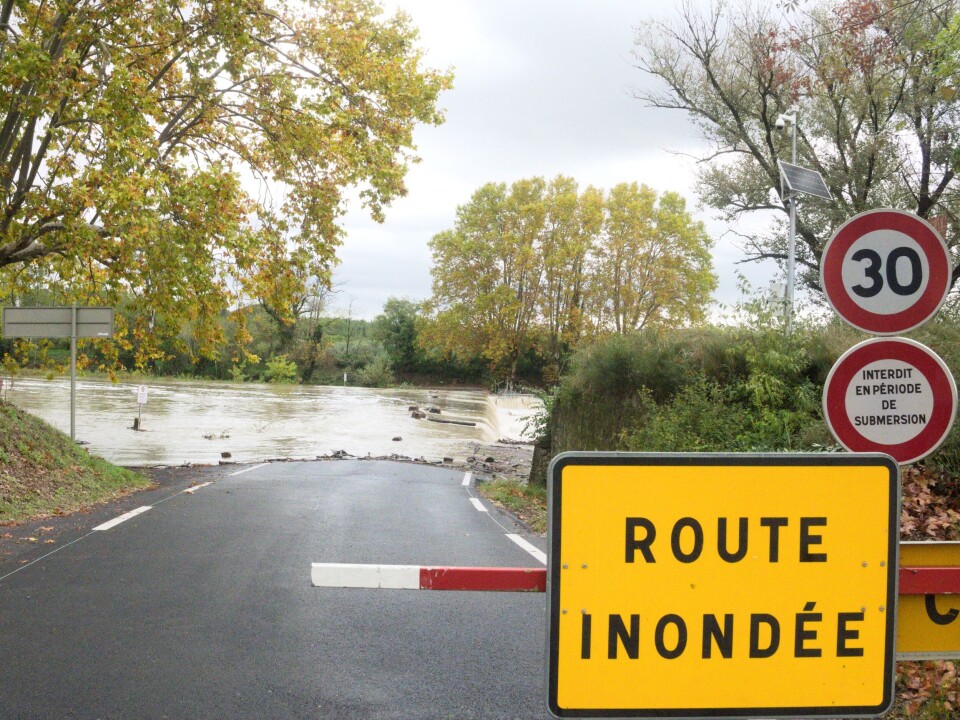-
Britons are the largest foreign community of second-home owners in Nouvelle Aquitaine
See which other departments in the region are popular with British nationals
-
Travellers risk extra costs under new Eurotunnel ticket rule
Some fare options are less flexible and less forgiving of lateness
-
May will be difficult month for train travel in France, warns minister
Two major train unions are threatening to strike and are ‘not willing to negotiate’, he says
We must prepare homes now for flash floods, says French fire chief
Intense hot weather often leads to storms and heavy rainfall, which causes floods when landing on dry, hard ground

France must prepare for the possibility of significant rainfall and flash flooding now that its latest heatwave is over, the spokesperson for the country’s fire and rescue services has said.
Read more: Cooler temperatures and storms replace heatwave in France
Heatwaves can often be followed by storms and heavy rain, and when the soil has hardened after months of dry weather, this can lead to floods.
Even yesterday, a storm around Montpellier caused the level of the river Lez to rise dramatically and break its banks in some places.
This year in France, the rising temperature of the Mediterranean, whose water reached 30C around Antibes in July, 4-6C higher than usual, can contribute to the development of storm systems.
National forecasting service Météo France describes these ‘Mediterranean episodes’ as being caused by “rising hot, moist and unstable air, coming from the Mediterranean, which can produce violent storms.
“This is a fairly classic weather phenomenon for the end of summer [...] but the warmer the water is, the more violent the episode risks being,” Caroline Jane Muller, an Austrian researcher, told Le Figaro.
‘We fear this period’
Eric Brocardi, the spokesperson for France’s firefighters told Franceinfo: “We fear this period following long heatwaves and dryness. From la rentrée [return to school and work in September], we risk seeing quite significant flooding.
“We think especially of Storm Alex in 2020,” which caused the worst floods the south of France had seen for at least 120 years, and during which 10 people lost their lives.
“We know how to be ready, but we really must inform the population,” Mr Brocardi added. “It is in this period when everyone is on holiday and has some time to prepare their home for a risk such as a flood.”
Mr Brocardi said that, when floods occur, people often put themselves in dangerous situations by trying to save possessions which are at risk of being washed away.
This issue can be avoided by securing these items before the weather event arrives, putting valuable possessions on a higher floor and especially moving anything important out of cellars.
“Basements are actually the areas where people take unthinking risks because at the last minute, they want to go down to their cellar to see that all is well while, often, it is already too late.
“We must think about preparing our homes now. We are here to offer advice to local populations.”
Mr Brocardi added: “We are always ready to intervene” during a flood. “The same trucks which you see today in the fight against the fires you will see deployed for floods because they have very high engines, and four wheel drive which enables them both to pump water and to carry out rescues when roads are flooded.
“The firefighters will be the same. So what we are worried about is the lack of time between the end of the forest fires and the beginning of the floods. We need more rest [to be able to] help.
“Firefighters represent 0.003% of the French population and carry out 4.7 million interventions: that’s huge. There’s no holiday for firefighters.
“Our human resources are being exhausted [...] The number of interventions and call-outs is increasing, and the crises are more and more significant and take more time.
“We must reach the threshold of having 250,000 volunteer firefighters, compared to the 197,000 we have today, to enable us to absorb the demand.”
Read more: How to become a volunteer firefighter in France
Forest fires being brought under control
Wildfires which had been raging across Gironde, Drôme and Jura have now been contained and are no longer spreading, fire services have said.
Read more: France’s wildfires rage on as minister warns of more to come
In Gironde, six days after the resurgence of the fire near Landiras, which has now burnt an additional 7,400 hectares on top of the 14,000 destroyed in July, evacuated residents can now return home.
However, extinguished sections of the fire could restart at any time and firefighters remain vigilant to the risk.
In Jura, more than 1,050 hectares were destroyed in the south east of the department, in a blaze described as “historic” by authorities.
A new fire began in Pyrénées-Orientales last night, around the commune of Caudiès-de-Fenouillèdes. It has so far burnt 105 hectares of vegetation and 180 firefighters are at the scene, with reinforcements arriving from Aude and Hérault.
Related articles
Fire in Brittany’s mythical ‘King Arthur forest’ has been halted
Faulty farm machinery investigated as cause of south of France fire
























